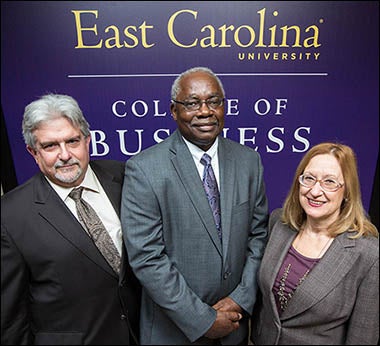FUNDING 911
ECU professors create plan to ensure emergency calls get answered
Most North Carolinians take it for granted that dialing 911 – even on a cell phone – will bring them help.
However, differences in technology and operating procedures across the state and nation continue to create a host of problems, from a delay in 911 services to no help arriving at all in crisis situations. Ongoing research by faculty members James Holloway, Elaine Seeman and Jim Kleckley in the East Carolina University College of Business is helping both state and federal entities learn how to fund 911 initiatives.
“Everyone thinks that 911 is everywhere, but unfortunately there are a lot of times when emergency messages don’t get through,” said Holloway.

ECU College of Business professors Jim Kleckley, James Holloway and Elaine Seeman are conducting research to improve 911 communications. (Photo by Cliff Hollis)
“Dialing 911 was easy when people had landlines tied to an actual address. But how do you find the location of someone who texts from a cell phone or calls via Skype? That’s the big challenge.” He explained one example involving the Virginia Tech shootings in 2007, when emergency text messages from students never got through.
To ensure 911 messages are received via a variety of communication methods, public safety answer points (PSAPs) have to possess the right equipment and dispatchers must be trained on how to use the new technology. The funding model developed by ECU professors determines how collection of a surcharge applied to the bills of all mobile phone owners gets divided fairly across the state to pay for those resources. There are more than 100 PSAPs statewide.
“Over the last six years, my colleagues and I have devoted much of our effort to researching these 911 issues, along with the funding and public policy involved,” said Holloway.
“It’s exciting to see our work take root and begin to make a difference as developing one 911 standard is explored.”
Their formula has gained national attention, and is commonly called the “ECU Funding Model.”
Holloway, Seeman and Kleckley have shared their “e911” expertise with the Federal Communications Commission, U.S. Department of Transportation, U.S. Department of Homeland Security, National Emergency Number Association, and the Pew Charitable Trusts. Earlier this year, they participated in a blue ribbon panel on funding 911 with experts from around the country.
-Jennifer Brezina
-Kathryn Kennedy in ECU News Services contributed to this article.